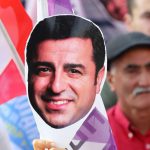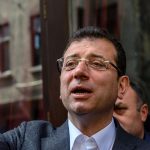Just like in Macbeth, extreme ambitions lead to a fall from grace. The results of Turkey’s March 31 local elections might tell a similar tale for President Recep Tayyip Erdoğan and his Justice and Development Party (AKP).
Just over a week after the AKP’s defeat in Turkey’s major cities, including Istanbul and Ankara, the AKP and its media are having great difficulty digesting the fact that the mayor’s office of Istanbul, the springboard for Erdoğan’s political rise in the 1990s, fell to Turkey’s main opposition Republican People’s Party (CHP). The Islamist movement in Turkey has held Istanbul for a quarter of a century.
The loss of Istanbul is huge for Erdoğan, who often refers to his so-called glory days as head of the city before he became prime minister in 2003.
Hard as it may be to lose such a stronghold, if there is one single factor that played a leading role in the AKP’s defeat, it was of course the economy.
Thus, Erdoğan’s choices in dealing with this major defeat, the first in his political life, will determine how Turkey weathers the economic storm, currently a mix of inflation, which is almost 20 percent, and economic contraction; an affliction commonly known as stagflation.
The signs are not good. Erdoğan’s AKP has applied for a total recount of alleged invalid votes in Istanbul after it became apparent that a partial recount in about half of the city’s 39 districts had failed to turn defeat into victory.
And on Monday, Erdoğan vowed to overturn the result, citing the recount request, legal recourse to the Supreme Electoral Board (YSK) and the use of prosecutors to sanction what he termed as criminal activity at the ballot box. The lira fell as a result.
Erdoğan is also expected to reshuffle his cabinet this month, getting rid of ministers who are seen as unpopular. One victim of the reshuffle could include Treasury and Finance Minister Berat Albayrak, Erdoğan’s son-in-law.
Erdoğan has two distinct paths he could follow: one being to accept reality, the other to use his vast powers to undermine the opposition victory and, should he fail to overturn the result in Istanbul, squeeze the municipality financially, along with that of Ankara, which also fell to the CHP.
The crux of that matter is that the new presidential system Erdoğan introduced last June is based on consolidation of power. While Erdoğan said the new system would speed up decision-making and make it more effective, it has failed to address Turkey’s pressing economic problems.
Furthermore, the government appears to be in denial, blaming Turkey’s economic ills on foreign powers and the internal opposition. Collective wisdom, which it appears does not exist currently, could aid the administration in steering Turkey out of the downturn, just as it did in the aftermath of the economic crisis in 2001 and during several political crises in the first decade of Erdoğan’s rule.
But such a moment of clarity, or an about turn, would require Erdoğan to take realistic steps and be willing to share power with others. In the case of the planned cabinet reshuffle, Erdoğan would then need to refrain from appointing ministers, politicians or advisors who lack the credentials to deal with Turkey’s economic maladies or to implement much-needed change. A big ask.
The second path would be the exact opposite. After the shock of losing control of the big cities, which are cash cows for the government and its business allies, Erdoğan could try to squeeze the life out of the CHP’s mayors, making it impossible for them to deliver services to their citizens. Such a psychology would push him into further consolidation of power, with or without a cabinet reshuffle.
It was Erdoğan who said those who control Istanbul control Turkey. Accepting the loss without a fight does not appear to fit with his political persona.
Should Erdoğan the pragmatist reappear, he would also step back from his inexplicable desire to purchase Russian-made S-400 missile systems that could push Turkey out of NATO or result in a new round of U.S. economic sanctions.
Erdoğan would also refrain from meddling in the daily workings of autonomous economic institutions, such as the central bank. He would also shift from categorically rejecting the option of International Monetary Fund financial help to bring Turkey out of recession. And of course, he would reverse course and re-introduce democracy for all.
Erdoğan has labelled the CHP’s Istanbul mayoral candidate Ekrem İmamoğlu as a “lame-duck” mayor, saying he and the AKP would be running Turkey and the parliament for the next four years, not the opposition.
The ongoing vote recount and the uproar at the result from the AKP ranks all suggest that Erdoğan and his entourage will have a hard time facing political and economic realities. But such an approach would make Turkey’s election-free period, stretching to 2023, a difficult one; just as tough as the past two years. A new economic reform package, due to be announced by Albayrak this week, would basically go under the train should Erdoğan choose tension, confrontation and lack of realism.
Turkey’s economic and political volatility looks set to continue. Early elections are a possibility, perhaps before the end of 2021, a forced IMF programme — provoked by further economic turmoil — could be on the cards, along with more negative political surprises.
Long-delayed structural reforms can only change the direction of Turkey’s economic ship in the medium to long term. Meanwhile, the country’s private sector external debt rollover problem, still unaddressed, has the muscle to spin the economy out of control.
In such critical times for the country, the government should quickly grasp the political and economic realities, and act accordingly. Otherwise, it’s fasten your seat belts for a rocky ride.
By Guldem Atabey
Source: Ahval News



